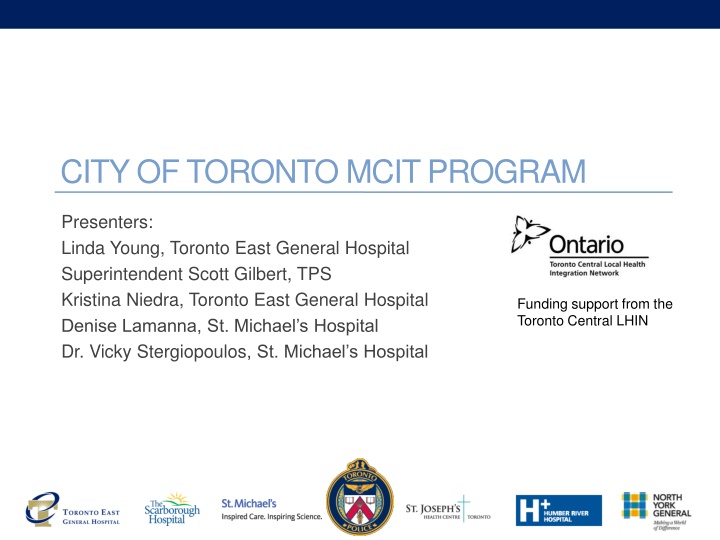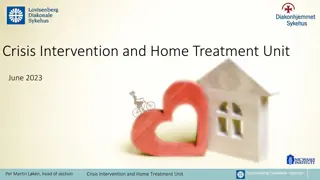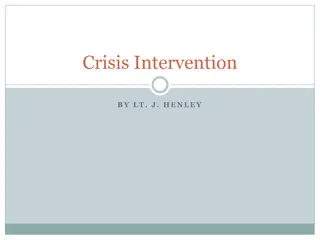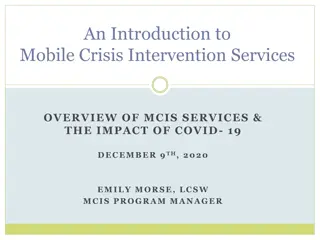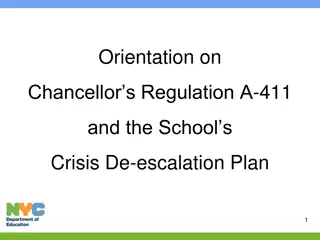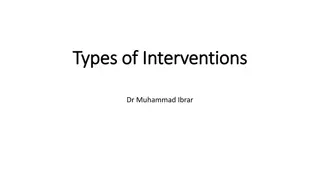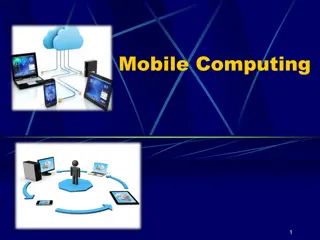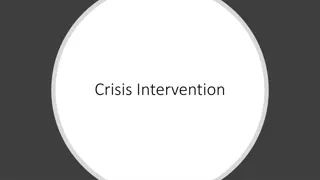Overview of Toronto's Mobile Crisis Intervention Teams (MCIT)
This content provides an in-depth overview of the Mobile Crisis Intervention Teams (MCIT) program in Toronto. It covers the existing models for police-mental health co-response, the development process of MCITs, and reviews findings on their operation and client experiences. The program aims to provide community crisis response to individuals experiencing mental health crises through partnerships between mental health nurses and specially trained police officers. Additionally, it details the evolution and implementation of the MCIT program in Toronto since its inception at St. Michael's Hospital in 2000.
Download Presentation

Please find below an Image/Link to download the presentation.
The content on the website is provided AS IS for your information and personal use only. It may not be sold, licensed, or shared on other websites without obtaining consent from the author.If you encounter any issues during the download, it is possible that the publisher has removed the file from their server.
You are allowed to download the files provided on this website for personal or commercial use, subject to the condition that they are used lawfully. All files are the property of their respective owners.
The content on the website is provided AS IS for your information and personal use only. It may not be sold, licensed, or shared on other websites without obtaining consent from the author.
E N D
Presentation Transcript
CITY OF TORONTO MCIT PROGRAM Presenters: Linda Young, Toronto East General Hospital Superintendent Scott Gilbert, TPS Kristina Niedra, Toronto East General Hospital Denise Lamanna, St. Michael s Hospital Dr. Vicky Stergiopoulos, St. Michael s Hospital Funding support from the Toronto Central LHIN http://www.stmichaelshospital.com/images/logo_stmichaels.gif
Objectives Introduce existing models for police-mental health co- response to mental health crises in the community. Learn about the process of developing and coordinating Toronto's Mobile Crisis Intervention Teams (MCITs). Review findings on MCIT's operation and client experiences. http://www.stmichaelshospital.com/images/logo_stmichaels.gif
Overview of Existing Models http://www.stmichaelshospital.com/images/logo_stmichaels.gif
Models of Crisis Intervention Response by both police and mental health professionals, in partnership Police response, in consultation with mental health professionals Response by specialized police officer Response by mental health professionals Peer response team http://www.stmichaelshospital.com/images/logo_stmichaels.gif
About the MCIT Program Provides a community crisis response to individuals who are experiencing a mental health crisis. Partners a mental health nurse (RN) and a police officer specially trained in crisis intervention. http://www.stmichaelshospital.com/images/logo_stmichaels.gif
Development of the MCIT Program http://www.stmichaelshospital.com/images/logo_stmichaels.gif
Building a Program First MCIT implemented at St. Michael s Hospital in 2000 By 2010, 4 hospitals in Toronto had MCIT Individual programs October 2012 Toronto Central LHIN (Local Health Integration Network) established MCIT Coordination Steering Committee Co-chaired by Toronto Police Services Deputy Chief Mike Federico and Toronto East General CEO Rob Devitt http://www.stmichaelshospital.com/images/logo_stmichaels.gif
MCIT Program Development Phase III 2014-2015 Phase IV 2015-2016 Phase I Oct 2012-2013 Phase II 2013-2014 Project scoping Current state Gap analysis Logic model Recommendations TEGH MCIT NYGH MCIT Protocol standardization Annual training program CRICH Implementation Evaluation City of Toronto MCIT model Data collection tools Program dashboard & monitoring Program expansion Standardization of protocols and ongoing training CRICH Outcome evaluation Program dashboard & outcomes monitoring Standardization of practices through design of orientation manual Continued to refine training for teams Linkages to follow-up services Expansion evaluation Toronto Police Service Community crisis stakeholders EMS CAMH Partner Hospitals TC, C & CE LHIN representatives Toronto Police Service & Partner Hospitals Centre for Research on Inner City Health TC LHIN Engagement of stakeholders on ad hoc basis http://www.stmichaelshospital.com/images/logo_stmichaels.gif
Implementation Structure City of Toronto MCIT Program Coordination Steering Committee MCIT Evaluation Working Group MCIT New MCIT Implementation MCIT Expansion Working Group NYGH MCIT Implementation N MCIT Expansion Working Group Standardization Working Group Implementation & Outcome Evaluation Model expansion to cover three remaining uncovered divisions Linkages with other EDs NYGH in partnership with TEGH and two police divisions Design of administrative and practice protocols to enhance consistency among teams Common indicators and standardized definitions MCIT Program Dashboard http://www.stmichaelshospital.com/images/logo_stmichaels.gif
Training http://www.stmichaelshospital.com/images/logo_stmichaels.gif
MCIT City-Wide Coverage NOW COVERING: 17 police divisions 627 square km http://www.stmichaelshospital.com/images/logo_stmichaels.gif
Ongoing Monitoring MCIT Daily Report Officer MCIT Data Collection Tool Nurse Average ED Wait Time Number of follow-up visits Number of visits Number of visits Number of shift cancellations Number of calls unable to attend to Number of repeat visits Number of clients brought to hospital Number of incidents/injuries Number of apprehensions % clients admitted to hospital Number of clients referred to services Average time to scene http://www.stmichaelshospital.com/images/logo_stmichaels.gif
MCIT Program Dashboard http://www.stmichaelshospital.com/images/logo_stmichaels.gif
Partnership Successes Collaboration across 3 LHINs Toronto Central, Central and Central East Cross-sector leadership partnership between healthcare and Toronto Police Service (TPS) Active participation at Steering Committee and Working Groups from all 6 hospital partners and TPS Joint team training including initial week-long and 4 annual city-wide training days http://www.stmichaelshospital.com/images/logo_stmichaels.gif
Challenges and Opportunities Cultural differences Training Role clarity Transportation and transfer of clients Lack of a coordinated mental health system http://www.stmichaelshospital.com/images/logo_stmichaels.gif
MCIT Outcome Evaluation http://www.stmichaelshospital.com/images/logo_stmichaels.gif
Evaluation research questions How have people in crisis experienced MCIT and Primary Response Unit (PRU) crisis response services? What is MCIT s role in Toronto s crisis resolution and prevention? What lessons were learned during the implementation of a coordinated MCIT program? http://www.stmichaelshospital.com/images/logo_stmichaels.gif
Evaluation methods Qualitative interview & focus group data Administrative data 15 clients of MCIT/PRU 1 4 July 2014 March 2015: 1. MCIT officers documentation: 4,313 service activities 17 TPS staff sergeants 15 TPS PRU officers 2. MCIT nurses documentation: 4,403 service activities 7 community agency staff members 3. PRU officers documentation: 19,254 calls for service 1 0 7 MCIT Steering Committee members http://www.stmichaelshospital.com/images/logo_stmichaels.gif
Evaluation findings Clients experiences impact of responders High value placed on a supportive and empowering approach: [MCIT staff] were compassionate interveners that was what I found made the biggest difference, like they weren't trying to escalate the situation. They were trying to de-escalate it, make it calmer. (Client) Well I didn't talk to the cop [on the MCIT team] I don t like cops. Interviewer: No? And why do you- Well, it really depends, like I was recently in [hospital] and there was a really nice cop we had a cool conversation. Like he treated me like a normal human being. (Client) High value placed on knowledge of mental health challenges and resources: [The MCIT was] so great because they just like, right away just kind of were problem-solving I got the sense like they really knew what they were doing. (Client) http://www.stmichaelshospital.com/images/logo_stmichaels.gif
Evaluation findings Client experiences impact of policies Clients needs can be met with flexibility and responsiveness We've had to sort of change the way we think about the job, and it's changed dramatically frontline officers in the PRU, they're still of that triage mindset. As quickly as they get to the radio call and deal with the person, they want to get closure and move on. (TPS staff sergeant) Clients value measured and non-criminalizing responses That's scary, when you're in that state of mind it's very intimidating when you open your door, and there's a nurse who looks like a police officer cause she has vest on, and then three police officers standing there. (Client) Keeping an eye on language and culture Mental health arrest (TPS staff sergeant) They used to take your body (TPS PRU officer) http://www.stmichaelshospital.com/images/logo_stmichaels.gif
Evaluation findings Client outcomes adverse events 98% of crisis interactions do not have charges laid 98% of crisis interactions have no injuries 1.4% of crisis interactions have a minor, self-inflicted injury to the client. http://www.stmichaelshospital.com/images/logo_stmichaels.gif
Evaluation findings Client outcomes transportation to ED Circumstances of transportation to hospital ED No. (%) Total: 2,726 (100.0%) Voluntary 364 (13.3%) MHA Apprehension: Section 17 523 (19.2%) MHA Apprehension: Form 1 145 (5.3%) MHA Apprehension: Form 2 136 (5.0%) MHA Apprehension: Form 9 10 (0.4%) http://www.stmichaelshospital.com/images/logo_stmichaels.gif MHA Apprehension: Form 47 69 (2.5%)
Evaluation findings Client outcomes connecting to services http://www.stmichaelshospital.com/images/logo_stmichaels.gif
Evaluation Findings Client Outcomes connecting to services http://www.stmichaelshospital.com/images/logo_stmichaels.gif
Evaluation findings MCIT and crisis resolution/prevention Participants from all samples perceived that the health and social service system does not adequately prevent mental health crises due to: Challenges in accessing information Part of it is, for us who are working in this field to have a greater scope of understanding of what is available out there. (Community agency) Waitlists There's no confidence that these groups are going to be able to respond quickly to minimize the crisis that somebody is in, and prevent it from escalating. (MCIT Steering Committee member) Prioritization of short-term management over long-term resolution I and a lot of other people have cost the healthcare system in terms of ER visits... it probably costs quite a lot of money that same money is not available for that person to see a psychologist. (Client) http://www.stmichaelshospital.com/images/logo_stmichaels.gif
Evaluation findings Strengths in coordination process Commitment by decision-makers: Police and healthcare have gotten to know each other a lot better some of it is the executive leadership we can, by virtue I guess of our positions just say, we're going to act differently . (MCIT Steering Committee) Attention to work culture: The police culture and the hospital culture are very different and every hospital has its own subculture as well we have learned about each other's culture and been quite deliberate and open to that enhanced understanding. (MCIT Steering Committee) Maintaining narrow focus: One of the reasons we've been successful is because we started by focusing on a little piece we had to keep coming back to, no, we're here to set up an MCIT system only. (MCIT Steering Committee) http://www.stmichaelshospital.com/images/logo_stmichaels.gif
Evaluation Findings Weaknesses in coordination process Accessing client input: It's extremely diverse even though there are [clients] that are on these committees, they don't represent everybody, or they don't consult with the people that they purport to represent which groups do you pick? Which leaders of these different groups do you pick? (MCIT Steering Committee) http://www.stmichaelshospital.com/images/logo_stmichaels.gif
For more information: Toronto Mobile Crisis Intervention Team (MCIT): Outcome Evaluation Report Lamanna D, Kirst M, Shapiro G, Matheson F, Nakhost A, Stergiopoulos V. To be available at: http://www.stmichaelshospital.com/crich/ Toronto Mobile Crisis Intervention Team (MCIT) Program Implementation Evaluation Final Report. Kirst M, Narrandes R, Francombe Pridham K, Yogalingam J, Matheson F, Stergiopoulos V. Available at: http://www.stmichaelshospital.com/crich/reports/mcit/ Co-responding police-mental health programs: A review. Shapiro GK, Cusi A, Kirst M, O Campo P, Nakhost A, Stergiopoulos V. Published in: Administration and Policy in Mental Health and Mental Health Services Research http://www.stmichaelshospital.com/images/logo_stmichaels.gif
Q&A http://www.stmichaelshospital.com/images/logo_stmichaels.gif
